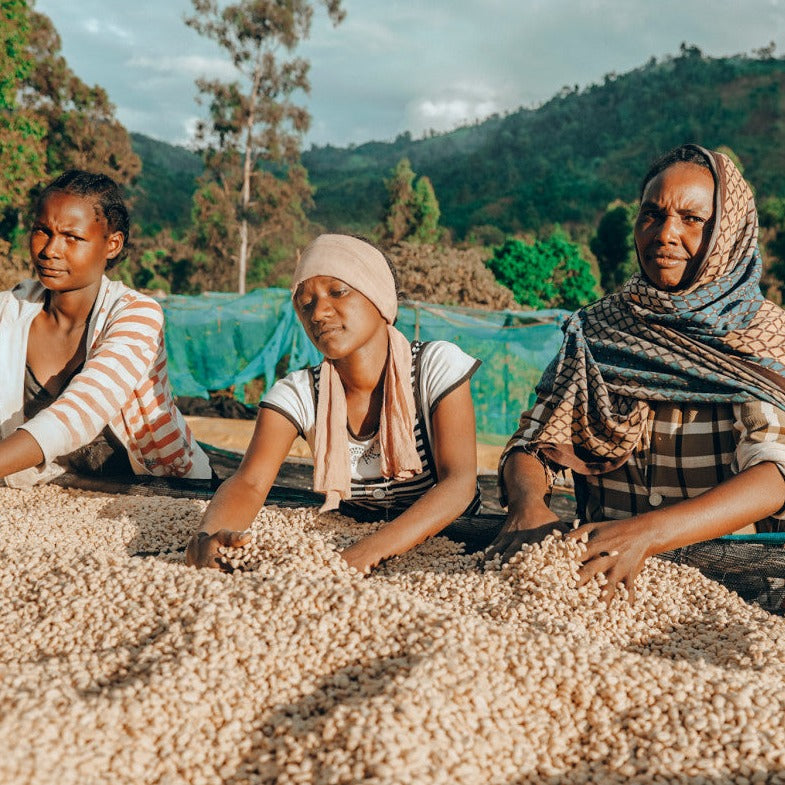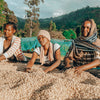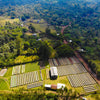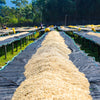Your cart is currently empty!
Ethiopia
Gatta Farm Fully Washed - Shantawene, Sidama
€15.90
Ethiopia Filter
Gatta Farm Fully Washed - Shantawene, Sidama
Savor the exquisite Daye Bensa coffee from Ethiopia's Sidama region, a masterpiece of taste. Grown at the Gatta Farm, this coffee exudes a symphony of flavors: juicy peach, delicate violet, sweet honey, and exotic golden kiwi. Enjoy a creamy body with a lingering, smooth fruity and floral aftertaste. A coffee experience like no other. Roasts on , ships on
Daye Bensa, founded by brothers Asefa and Mulugeta Dukamo, takes its name from the town 'Daye' and its region 'Bensa,' where the brothers grew up. Asefa constructed his first washing station in 1997 and set up another two the following year. Asefa’s younger brother, Mulugeta Dukamo, co-founded Daye Bensa and played a key role in the expansion of the washing stations. Surrounded by lush vegetation and century-old trees providing shade, the farm and drying station thrive in a natural setting.
Coffee holds a significant place in the family history, as Asefa and Mulugeta's father had been a coffee producer for many years. However, facing challenges in earning a substantial income locally, Asefa decided to transport his father's coffee to villages offering higher prices. Soon, he extended this service to other coffee farmers, transporting their produce to lucrative markets.
Asefa's efforts proved fruitful, allowing him to accumulate sufficient funds to purchase his first truck for cherry transportation, marking the inception of Daye Bensa. Over time, the brothers have expanded their enterprise to encompass 71 washing stations, 11 dry mills, and 4 proprietary farms. Asefa's son, Kenean, now represents the company, having returned from the United States to contribute primarily to quality enhancement and promoting the value of Ethiopian coffee.
Daye Bensa has evolved into one of Ethiopia's most successful export companies, distinguishing itself through a commitment to quality and substantial investments in the local communities and regions where their coffees are cultivated.
The Sidama region boasts an ideal climate for cultivating high-quality coffee, thanks to its fertile soils and elevated altitudes. However, producers in this area grapple with various challenges, such as limited access to essential resources like electricity, water, telecommunication, and proper roads. Additionally, farmers often lack exposure to optimal coffee farming practices. In response to these issues, Daye Bensa has undertaken proactive measures through their 'Back to the Community' projects. These initiatives focus on addressing challenges by constructing connecting roads between villages, installing electricity transformers, and providing farmers with training on coffee plantation techniques and improved agricultural practices.
Despite the natural 100% organic nature of most coffee produced in this region, formal certification is often lacking. This absence stems from the high costs associated with certification, making it financially challenging for farmers to afford chemical fertilizers, pesticides, or herbicides.
This lot comes from their Gatta Farm.
Gatta Farm serves as the focal point for their dedicated specialty program. Located in the heart of Shantawene Village within Sidama Bensa, Ethiopia, the farm is situated at an altitude ranging from 2120 to 2210 meters, nestled amid a natural forest. Surrounded by indigenous trees, some over a century old, as well as waterfalls and rivers, the farm derives its name from a waterfall traversing its grounds.
Originally a natural forest, Gatta Farm was discovered by co-founder Mulugeta Dukamo. The first coffee plants were planted in 2013, and the drying station was established in 2017. The encompassing vegetation and forest play a crucial role as natural shading for both the farm and the drying station. Local residents, including women primarily engaged in quality control and processing (excluding labor-intensive tasks), manage plantation, harvesting, and processing activities. Providing employment opportunities and fair wages significantly benefit the local community.
Beyond being a farm, Gatta Farm includes a drying station, a lodge, and a training facility. During the harvesting season, the drying station becomes operational and provides accommodations for employees or trainees until the completion of training. The training facility offers instruction in coffee processing for individuals interested in learning more about the industry.
Process:
The cherries are handpicked and floated. They are then left to soak in water for pre-fermentation for 36 to 72 hours, afterwards de-pulped before washing. After washing, the coffee is laid to dry on African beds for 8 to 12 days. During this phase, the parchment coffee is regularly moved and rotated to ensure a uniform drying process.
In the cup: Peach, violet, honey, golden kiwi. Creamy body with a smooth and long lasting fruity and floral aftertaste.
Minimum resting period: 10 days from roast date for espresso roast, 7 days for filter roast.
| Origin |
|---|
| Ethiopia |
| Region |
| Shantawene, Sidama |
| Gatta Farm |
| Producer |
| Elevation |
| 2120 - 2210 masl |
| Varietals |
| Ethiopian Heirloom |
| Processing method |
| Soaked for 36-72h, fully washed, dried on African beds |
| Roast |
|
Two profiles available: For espresso & moka pot For filter |
| Tasting Notes |
| Peach, violet, honey, golden kiwi |












